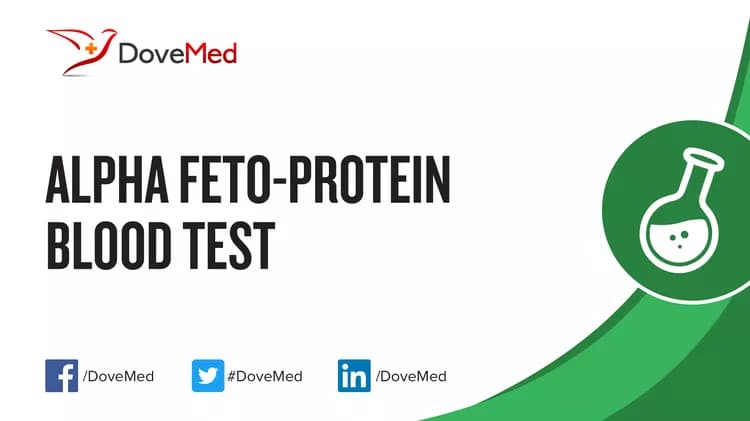What are the other Names for this Test? (Equivalent Terms)
- AFP Blood Test
- Alpha Fetoprotein Blood Test
What is Alpha Feto-Protein (AFP) Blood Test? (Background Information)
- Alpha feto-protein (AFP) is a form of serum protein similar to albumin, the most abundant protein in blood. It is produced by a developing fetus in the liver, yolk sac, and the gastrointestinal tract
- The level of alpha fetoprotein starts to decrease soon after birth and is very low in normal adults. However, the level of AFP may increase in the following cases:
- During pregnancy and pregnancy related complications that may involve both the expectant mother and developing baby
- Liver diseases
- Presence of certain malignancies (that mostly involve the liver, either directly or via metastasis)
- In some conditions, such as with certain chromosomal disorders, the AFP levels may decrease
- The Alpha Feto-Protein (AFP) Blood Test measures the amount of alpha fetoprotein in blood in children and adults. The test can help in the diagnosis of various tumor and non-tumor conditions
What are the Clinical Indications for performing the Alpha Feto-Protein (AFP) Blood Test?
The Alpha Feto-Protein (AFP) Blood Test is performed under a variety of circumstances. Following are the clinical indicators for performing the test:
- During pregnancy
- As part of the triple screen or quad screen test
- Suspicion of neural tube defects, such as spina bifida, in the developing fetus
- Positive family history of disorders such as Down syndrome or Edward syndrome
- Presence of yolk sac tumor affecting the expectant mother or fetus
- In infants and children (to diagnose or treat)
- Hepatocellular carcinoma (HCC)
- Germ cell tumors that include embryonal carcinomas and yolk sac tumors that involve the testis or ovary
- In the context of charactering tumors (to help with early diagnosis and treatment)
- Suspicion of hepatocellular cancer, or germ cell cancer of the testis, or ovarian cancer
- Monitoring of cancer recurrence
- Monitoring effectiveness of the treatment provided
How is the Specimen Collected for Alpha Feto-Protein (AFP) Blood Test?
Following is the specimen collection process for Alpha Feto-Protein (AFP) Blood Test:
Sample required: Blood
Process of obtaining blood sample in older children and adults:
- A band is wrapped around the arm, 3-4 inches above the collection site (superficial vein that lies within the elbow pit)
- The site is cleaned with 70% alcohol in an outward spiral, away from the zone of needle insertion
- The needle cap is removed and is held in line with the vein, pulling the skin tight
- With a small and quick thrust, the vein is penetrated using the needle
- The required amount of blood sample is collected, by pulling the plunger of the syringe out slowly
- The wrap band is removed, gauze is placed on the collection site, and the needle is removed
- The blood is immediately transferred into the blood container, which has the appropriate preservative/clot activator/anti-coagulant
- The syringe and the needle are disposed into the appropriate “sharp container” for safe and hygienic disposal
- In newborns, infants, and younger children, the blood sample is drawn from the heel after making a small nick using a scalpel. This is called a heel stick
Preparation required: No special preparation is needed prior to the test.
Occasionally, amniotic fluid samples to test AFP levels, may be obtained from pregnant women through the process of amniocentesis.
What is the Significance of the Alpha Feto-Protein (AFP) Blood Test Result?
The significance of Alpha Feto-Protein (AFP) Blood Test depends on the clinical scenario and is explained.
In pregnancy, elevated AFP levels may indicate:
- Neural tube defects, such as spina bifida, and other birth abnormalities
- Genetic disorder that includes methylenetetrahydrofolate reductase deficiency disorder
- Placenta abruption (premature placental detachment)
- Presence of yolk sac tumor (or endodermal sinus tumor)
- Multiple pregnancy (twins/triplets, etc.)
In pregnancy, decreased AFP levels may indicate:
- Chromosomal disorders including Down syndrome and Edward syndrome
- Gestational diabetes
In infants and young children, increased AFP levels may indicate:
- Hepatocellular carcinoma (involving the liver)
- Hepatoblastoma
- Embryonal carcinoma
- Yolk sac tumor
When performed to characterize malignancies in older children and adults, increased AFP levels may indicate:
- Hepatocellular (liver) cancer, or cancer of the ovary, or metastatic tumors affecting the liver
- Presence of certain testicular tumors such as yolk sac tumor, embryonal carcinoma, choriocarcinoma, or mixed germ cell tumor
- If AFP levels rise in patients treated earlier for malignancy, it may indicate a return of the condition
The laboratory test results are NOT to be interpreted as results of a "stand-alone" test. The test results have to be interpreted after correlating with suitable clinical findings and additional supplemental tests/information. Your healthcare providers will explain the meaning of your tests results, based on the overall clinical scenario.
Additional and Relevant Useful Information:
- In almost all cases, the physician may recommend additional tests to diagnose and/or determine clinical management. Such additional measures may include repeating the tests, further blood tests, imaging studies, and tumor biopsies
Certain medications that you may be currently taking may influence the outcome of the test. Hence, it is important to inform your healthcare provider, the complete list of medications (including any herbal supplements) you are currently taking. This will help the healthcare provider interpret your test results more accurately and avoid unnecessary chances of a misdiagnosis.
Related Articles
Test Your Knowledge
Asked by users
Related Centers
Related Specialties
Related Physicians
Related Procedures
Related Resources
Join DoveHubs
and connect with fellow professionals


0 Comments
Please log in to post a comment.